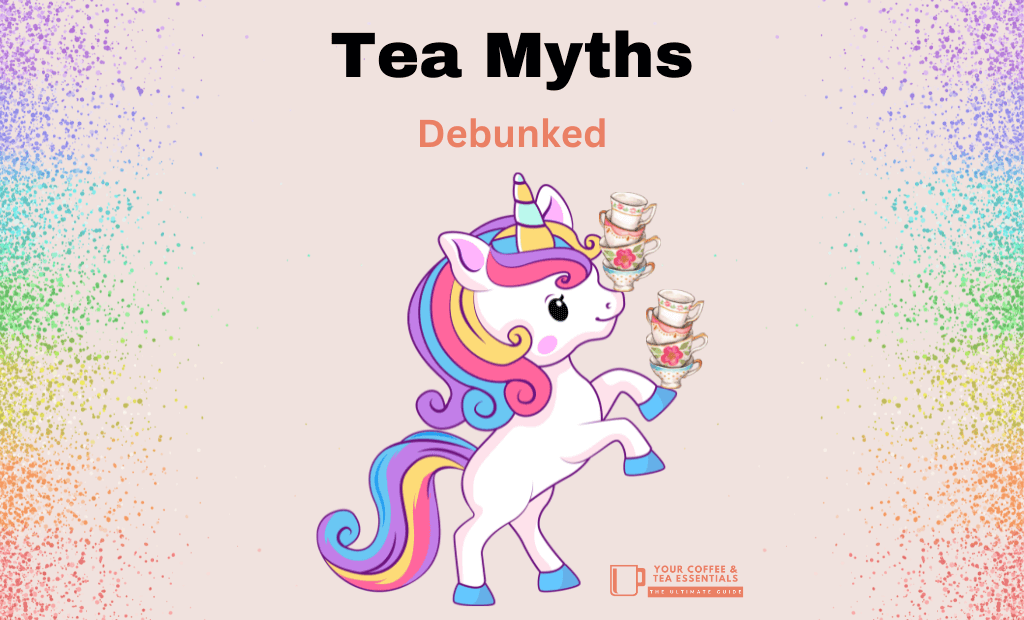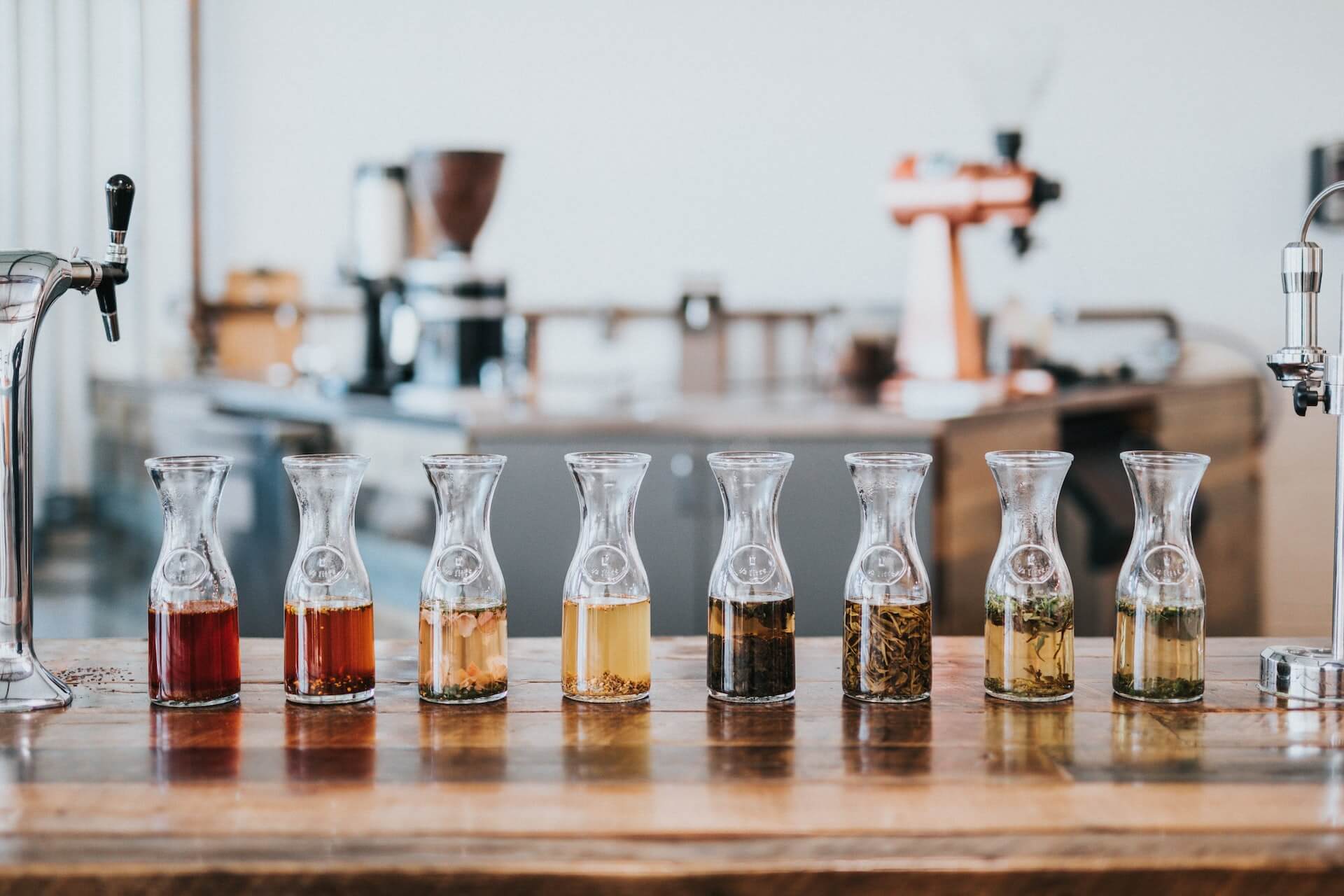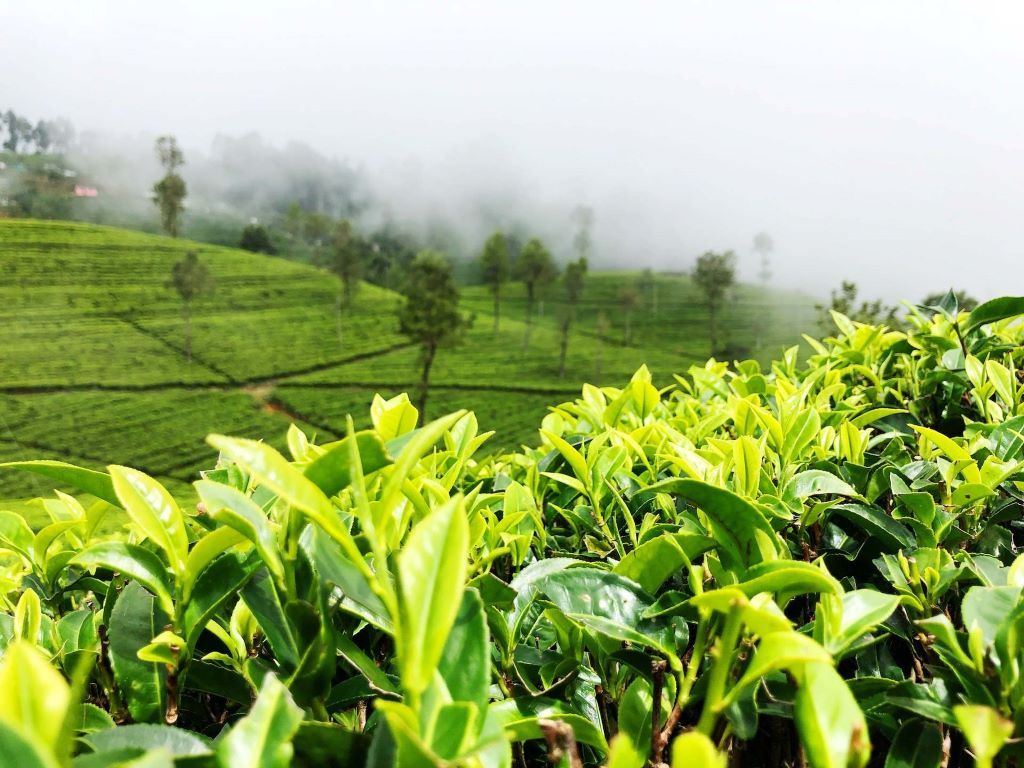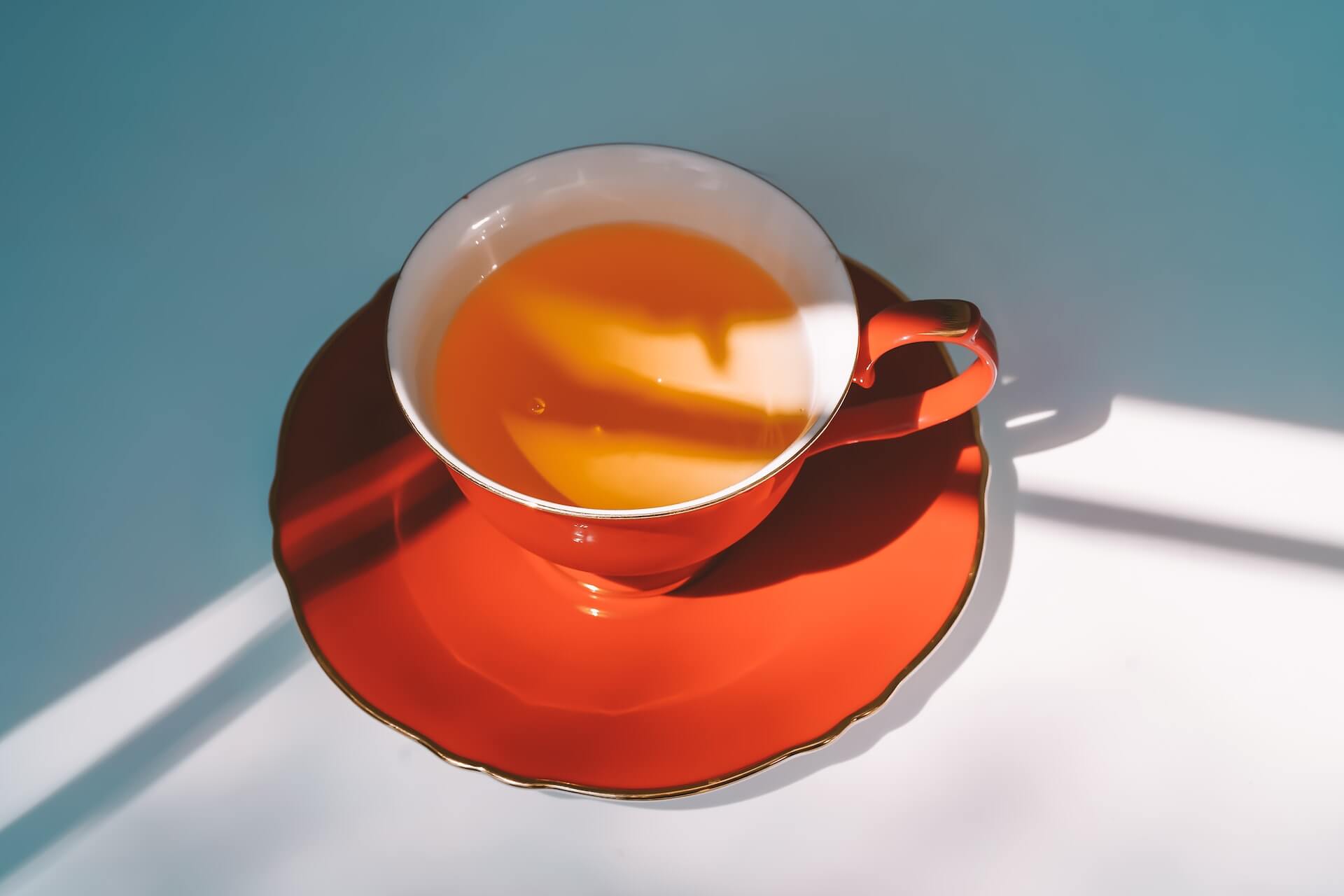Debunking 10 Unbe-Leaf-able Tea Myths: What’s True & What’s Not?

You’d hardly think of tea as a controversial topic. But over the years, some tea myths have arisen about this beverage that are hotly debated and need to be debunked.
The topic of tea can lead to endless arguments between the uninformed, so we will ensure that this doesn’t happen to you the next time you drink tea with your know-it-all friend.
We’re about to debunk 10 myths about tea that will put any debate to rest and ensure that everyone gets oolong.
Join us as we tell you the truth about the following facts!
1. Tea Has More Caffeine In It Than Coffee
This is likely one of the most common tea myths.
Caffeine is the most popular natural stimulant in the world (1). A cup of coffee can contain between 90 and 200 mg of caffeine, while caffeine concentrations for white, green, and black teas range from 14 to 61 mg per 6-8 oz serving (2).
Even high-caffeine teas such as matcha or Pu’er teas peak at around 75 mg of caffeine per cup.
So, it’s safe to say that coffee definitely has more caffeine in it than tea, regardless of the type of tea you’re drinking.
If you’re looking for ways to reduce your daily caffeine intake but aren't a fan of decaf coffee, switching over to tea is a great idea.
Related Read:
2. Decaf Tea Has No Caffeine Content
Many people prefer drinking decaffeinated coffee or tea to reduce their caffeine consumption.
But how decaffeinated is decaf, anyway?
Unfortunately, even decaffeinated tea contains trace amounts of this stimulating chemical. In order to qualify as decaf, a cup of tea must contain no more than 2.5 mg of caffeine. Even though this amount is negligible, people who want to avoid caffeine completely should steer clear of all decaffeinated teas and coffees.
Instead, drink herbal teas, which have no caffeine at all!
3. Adding Milk Diminishes The Health Benefits Of Tea
This myth is a tricky one as it’s a bit double-edged. There are studies that show that adding dairy milk to tea can decrease its antioxidant capacity as milk proteins bind with antioxidants and reduce their efficacy (3).
However, this point still needs further research. Another study’s results suggest that drinking black tea does indeed increase blood antioxidants levels, and that adding milk to tea did not inhibit this effect (4).
How your body absorbs antioxidants can depend on the type of tea and whether you’re adding dairy or plant-based milk.
Essentially, further evidence is needed to determine if milk does diminish the health benefits of tea and whether it negates them in any significant way.

4. All Slimming Teas Work The Same
There are many different types of teas that can suppress your appetite, speed up your metabolism, and help you lose a healthy amount of weight. But not all slimming teas are made equal.
Some teas act as appetite suppressants, such as peppermint tea, fermented Pu-erh tea, or green tea. True teas (from the Camellia sinensis plant) are able to increase the metabolic rate, helping the body process food faster. Examples include oolong tea, ginger tea, and green tea.
There are even some teas that help to cleanse and detoxify the system to help lower cholesterol levels and promote a leaner figure, such as chamomile tea, dandelion root tea, and, you guessed it, green tea.
However, some slimming teas contain ingredients such as Garcinia cambogia which can be harmful to your body.
Ultimately, slimming teas all perform slightly different functions. Many of them have overlapping effects on the body, which makes them beneficial for a variety of reasons.
Pssssstt…want to learn more about losing weight with green tea? Check out our comprehensive post!
5. Tea Can’t Expire
Because stored tea is dried out or preserved plant matter, it takes a very long time for it to become undrinkable. If tea had an expiration date, it would be up to a decade or even longer if it’s stored correctly.
If you store your tea in a sealed glass jar in a cool environment, there’s no reason why it should go off. And even if it does, the only real issue would be a lack of flavor and fragrance.
The reason is tea is dried and thus there is little chance for bacteria or algae in the water to spoil the tea.
However, if your tea is exposed to moisture or stored in a damp environment it will definitely turn bad!
6. Tea Bags and Loose Leaf Tea Are The Same
Tea bags and loose leaf tea are completely different products. While both tea types come from the same plant, the way they are packaged and processed differs significantly.
Tea bag tea is typically made of lower quality tea sometimes known as “tea dust”. These are the remaining bits when higher loose-leaf tea leaves are categorized and processed.
Loose leaf tea, on the other hand, typically comes in a jar. You spoon out the amount you want into a cup or pot, pour boiling water or hot water over it, brew it, and then strain it to filter out the infused tea leaves.
Loose leaf teas are usually of higher quality. This means a more flavorful tea with more concentrated benefits.
In short, while tea bags and loose-leaf teas come from the same plant, they are not the same. The latter one is usually of much higher quality and can have more concentrated benefits.
7. Herbal Teas Are Always The Healthiest
There are very few types of teas that are bad for your health. Most teas produce positive health benefits for the body and mind, but not all of them are necessarily herbal tea.
These include true teas, flower petals tea, root teas, bark teas, mushroom teas, and other teas such as yerba mate tea. Did we mention true teas?!

8. Teas Cannot Trigger an Allergic Reaction
Although tea allergies are extremely rare, they have been known to occur. Essentially, tea is a plant and plant-based allergies are something anyone can suffer from.
Some people are also allergic to chamomile, caffeine, or fruit teas. Typical reactions include an itchiness and/or a swollen mouth.
However, this is very rare and easily treatable by avoiding teas you are allergic to.
9. Hot Tea Is More Beneficial Than Cold Tea
Researchers have shown that tea antioxidant activity is significantly impacted by steeping temperature and time (5). What these impacts are, depends on the type of tea.
For example, white tea released the most antioxidants in prolonged steeping times, both in hot and cold water. Green tea yielded the most antioxidants when steeped in cold water for a long time. Finally, for black tea, antioxidant activity was at its highest when steeped in hot water for a shorter time (5).
10. Tea Is Good for Shock
Offering a cup of sweet tea to someone undergoing shock might be tempting. However, the caffeine content of tea will make things worse. This is because caffeine will increase the adrenaline response.
However, some herbal teas such as lemon balm, mint, or chamomile teas can help produce a calming effect.
Take the Time For Tea
Tea is a wonderful, universally appreciated beverage that comes in a wide range of different flavors, colors, and health benefits.
After all, varie-tea is the spice of life!
Related Reads:
- Is Tea Acidic? This Is The Most Comprehensive Guide
- Wondering What is the Best Tea for a Cold?
- Assam Black Tea - One of the Most Popular Drinks Worldwide!
Frequently Asked Questions
Is there caffeine in decaf tea?
Yes. Decaffeinated tea contains trace amounts of caffeine (around 1 to 2 percent).
Can all teas help you lose weight?
No, there are certain teas that contribute to weight loss in different ways. Each type of tea is different. However, true teas, from the Camellia sinensis plant can help you lose weight.
Can I be allergic to tea?
Yes, tea is made from the leaves of a plant, and you may be allergic to the plant.
Are tea allergies common?
No, they are rare and generally mild.
What makes loose leaf tea different from tea bags?
Loose leaf tea is of higher quality and allows water to flow more freely thereby enhancing flavor and benefits extraction. Tea bags contain “leftover” tea dust that is usually of lower quality.

Bottom Line
We've separated fact from fiction. We hope you have found these tea myths interesting and that you have learned something new!
Now that you know the truth about tea, you can make an informed decision about your choices. From the lower caffeine content to the calming effects, it’s a tea-rific beverage you can enjoy for multiple different reasons. And there's a type of tea to suit everyone's needs.
So, go ahead and pour yourself a cup—whether it's decaf, herbal, hot or cold, milky or black!
This article is intended for informational purposes only. It is not meant to replace professional medical advice, treatment or diagnosis. Do not consume any type of coffee, tea or herbal infusion if you are allergic to it. The information in this article is not intended to treat serious medical conditions. Please seek professional medical advice before using home remedies.